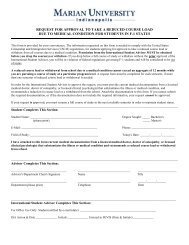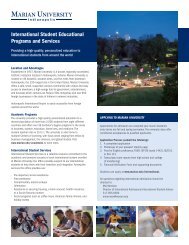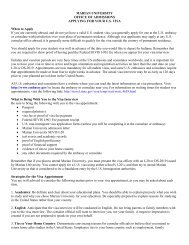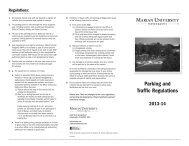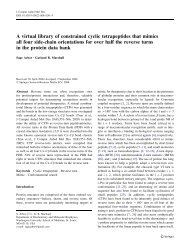2009-11 Marian University Course Catalog, fall 2010 edition
2009-11 Marian University Course Catalog, fall 2010 edition
2009-11 Marian University Course Catalog, fall 2010 edition
Create successful ePaper yourself
Turn your PDF publications into a flip-book with our unique Google optimized e-Paper software.
solving. Experiment implementation, research paper, and<br />
writing assignments reflecting critical thinking are required.<br />
(SPR)<br />
PSY 350<br />
Behavioral Neuroscience 3 credits<br />
Prerequisite: 101 or 220. This is an overview of the latest<br />
findings from the neurosciences pertinent to relationships<br />
between behavior and the nervous system, including the<br />
neural and chemical processes underlying sensation,<br />
motivation, learning, cognition, and disorders. Dissections<br />
and supplemental readings are required. (FAL)<br />
PSY 355<br />
Psychology of Religion 3 credits<br />
Prerequisites: 101, or 220 and THL 105. An investigation of<br />
the interrelatedness of psychology and theology in the study<br />
of religious experience and spiritual development. The study<br />
of the religious aspects of the person is approached from<br />
various psychological and theological perspectives. Crosslisted<br />
as THL 355. (2SO)<br />
PSY 360<br />
Internship/Service Learning<br />
in Psychology 2-3 credits<br />
Prerequisites: Junior status, a 2.0 cumulative GPA, and<br />
instructor permission. The purpose of this academic<br />
internship is: (a) to provide real world experiences through<br />
which students can apply what has been learned in the<br />
classroom, and (b) to provide an opportunity for service<br />
learning. Students are placed in a supervised experience in<br />
psychology or a related field according to their career<br />
interests and academic abilities. A minimum of five hours per<br />
week of on-the-job work is required to earn each credit.<br />
Students are evaluated by their on-the-job supervisor and by<br />
a journal submitted to the monitoring faculty member. This<br />
course may be repeated for an accumulated total of six<br />
credits. Internship/service learning credits do not count<br />
toward credits required in the major. Graded<br />
S/U. (SEM)<br />
PSY 365<br />
Psychology of Adolescence 3 credits<br />
Prerequisite: 101. This course is a study of developmental<br />
issues and experiences of adolescence viewed from major<br />
theoretical perspectives. Adolescent development is studied<br />
as a dynamic interaction of physical, cognitive, and<br />
social/contextual factors. Topics include puberty, cognition,<br />
identity, sexuality, family and peers, values and beliefs, and<br />
problems of youth. Analytical homework assignments and an<br />
integrative project are required. (SPR)<br />
PSY 370<br />
Clinical Psychology 3 credits<br />
Prerequisites: 230, and 335. An introduction for the advanced<br />
undergraduate psychology student to the field of clinical<br />
psychology and the application of scientifically based<br />
paradigms to clinical practice. The course focuses on use of<br />
scientifically validated techniques for developing clinical case<br />
conceptualizations. Topics include history of the field,<br />
theoretical foundations of research and practice, assessment,<br />
and intervention strategies for individual, family, forensic,<br />
marital, and group treatment. (2SE)<br />
PSY 371<br />
Introduction to Art Therapy 3 credits<br />
See ART 371. (2FE)<br />
PSY 400<br />
Program Assessment and Evaluation 3 credits<br />
Prerequisite: 205 or BUS 205. A study of advanced applied<br />
assessment methods for use in mental health, medical,<br />
business, and educational settings. Basic assessment models,<br />
evaluation models, and techniques for the planning,<br />
implementation, data management, and analysis of program<br />
outcomes are presented. Students apply acquired content<br />
and techniques to (a) evaluate selected case studies in their<br />
disciplines; (b) perform a program assessment and evaluation<br />
of simulated or actual program outcomes data; and (c)<br />
construct and present a professional evaluation report of<br />
their assessments. (ADD)<br />
PSY 280, 380, 480<br />
Special Topics in Psychology 2-3 credits<br />
Prerequisite: Instructor permission may be required. A special<br />
topic in psychology is explored. An APA-style laboratory or<br />
library research paper is required for 380 and 480. This<br />
course may be repeated for credit because its subject matter<br />
varies, for example, sex roles, forensic psychology,<br />
stereotyping and prejudices, and eating disorders. (ADD)<br />
PSY 490<br />
Senior Seminar in Psychology 3 credits<br />
Prerequisite: Senior psychology major. In this capstone<br />
course, students demonstrate the ability to use psychological<br />
concepts and skills in the examination of a college-wide<br />
general education theme. Integrative papers, oral<br />
presentations, research projects, and convocation attendance<br />
are required. Students also begin formal preparation for<br />
graduate school or careers and perform program skills selfassessments.<br />
(FAL)<br />
PSY 497<br />
Directed Research I:<br />
Research Proposal 2 credits<br />
Prerequisites: 205, 250, 300, and instructor permission. This<br />
course is designed to provide the opportunity for junior and<br />
senior psychology majors to begin an independent research<br />
project under the guidance of a faculty sponsor they have<br />
chosen. Students identify a research topic, perform a<br />
literature review, create a research design and materials to<br />
investigate their topic, and write an APA-style research<br />
proposal that summarizes these activities. Successful<br />
124




